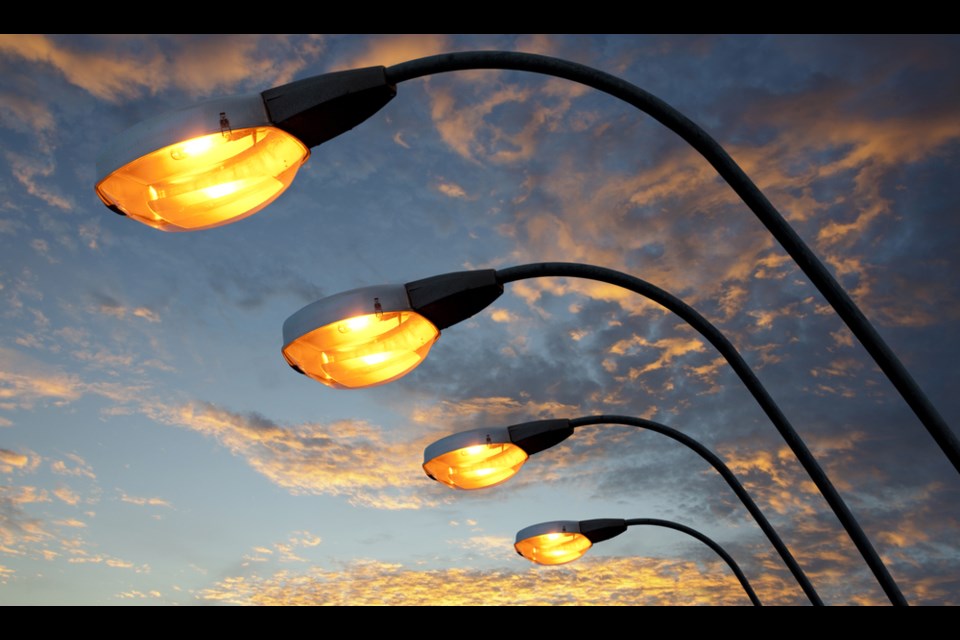City councillors seem poised to give the green light to move forward with a $2.4-million plan to upgrade the city’s streetlights to LED lighting.
The idea will be discussed during upcoming budget deliberations, but after the initiative was unveiled at this week’s introduction to the 2020 budget, it seems likely the concept will be approved.
Renee Recoskie, the city’s manager of environmental compliance, shed some light on the idea Monday at City Hall as councillors met to talk about the budget.
She said many cities have upgraded their streetlights to LED technology in recent years. They’ve done so for two reasons: energy savings and savings related to operation and maintenance.
Currently, the city’s 3,200 streetlights are high-pressure sodium lights; they produce heat in addition to light, which is why they are more expensive to operate.
“By converting the city’s streetlight network, it is estimated the city would reduce the network’s energy usage by 76 per cent,” Recoskie said.
That would also “translate into a 40 per cent reduction in streetlight electricity bills,” she said, noting some fixed costs related to electricity would not be impacted.
She said upgrading to LED would extend the lifespan of the lights by “four to five times what is experienced today” while reducing the number of replaceable parts.
That would mean maintenance costs would be reduced by almost 80 percent, she noted.
As a result, the city could recoup its $2.4 million investment in just under six years.
But that’s only part of the equation. City staff are also recommending equipping the city’s streetlights with "smart" lighting controls.
Currently, photocells on the streetlight head respond to light detected; when the amount of light is too low, the streetlight comes on.
Moving to a smart (computerized) system would allow lighting levels to be adjusted remotely.
The cost of the smart system is about $450,000 of the $2.4 million price tag - or about 20% of the overall cost.
Recoskie explained how “these controls can accurately measure and report energy usage, which, in turn, can be used to monitor greenhouse gas emissions” and their impact.
The LED lights would equate to an estimated annual reduction of 70 metric tonnes of greenhouse gas emissions. That could be further increased by using smart controls.
A smart system would also reveal outages in real time “allowing for a faster maintenance response.”
Smart technology would also, potentially, pay off more down the road.
“The controls will enable the city to be future-ready, connected and technologically equipped,” said Recoskie, who stressed “technology is advancing at an astonishing pace in this realm.”
For example, she said streetlights are now being equipped with air and noise quality monitors, the ability to change colour and flash in response to emergency responders and monitor and detect open parking spaces.
“These more advanced applications have not been widespread in Ontario,” she noted. “However without this connected, control-enabled network, the city would not be able to continue to evolve and expand on these future opportunities.”
There is a caveat to the smart technology and that involves using a single-source supplier - and not tendering the project.
“To deliver a complex project of this nature under considerable time constraints will rely heavily on an experienced, well positioned team,” said Recoskie. “Staff recommend the contract be awarded to Real Term Energy.”
She said they “can deliver a turn-key approach for the LED conversion” and have done so - to rave reviews - in Barrie and Severn Township.
Coun. Pah Hehn echoed the sentiments of many around the council table after the presentation.
“To me, this is a no-brainer,” said the Ward 4 councillor. “It costs less and it’s better lighting.”
Her only concern was how long the conversion process would take.
When Recoskie said the goal was to upgrade the entire network of 3,200 streetlights in 2020, several councillors clapped.
“I’m really excited about this,” said Coun. Jay Fallis, who complimented staff on the initiative.
He said context was important and noted that the reduction of 70 metric tonnes of greenhouse gas emissions was the equivalent of nine million smartphones charged.
“I think it shows the significance of this project,” said Fallis.
Coun. Ted Emond agreed. He noted the condominium where he resides converted to LED lighting two years ago and has reaped “significant financial savings and better lighting,” among other improvements.
Upon reading about the merits of the project in the city’s budget package, Emond’s thought was: ‘Hey, this is a no-brainer. Let’s move.”
No decisions were made Monday. It will be up to budget committee - comprised entirely of mayor and council - to decide on the project during upcoming budget deliberations.
A special meeting of council is slated for Dec. 9 at which time the budget will be ratified.
